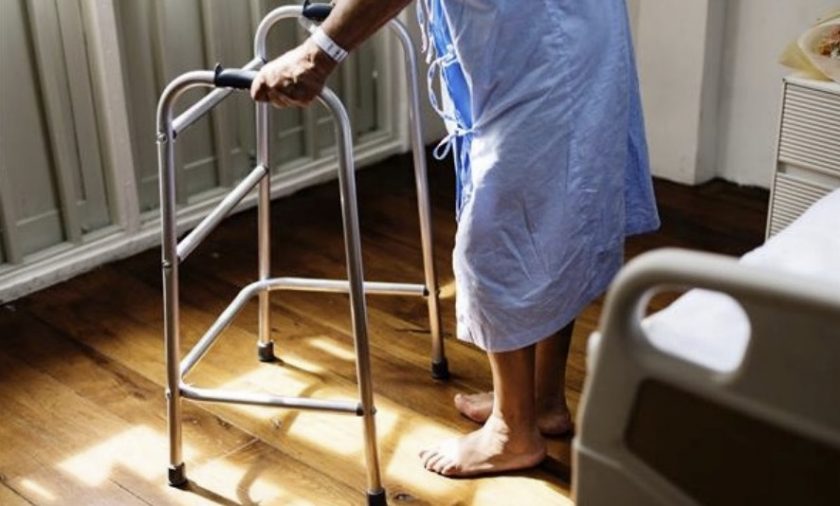Workforce crisis in social care resulting in delays to discharging patients from hospital

A workforce crisis in social care is resulting in patients waiting longer than necessary to be discharged from hospital.
In some cases people can be left waiting days or even weeks to leave the hospital after they have recovered from illness.
A report released by the Senedd’s Health and Social Care Committee found that delayed transfers of care have been exacerbated by the coronavirus pandemic and recruitment issues in the health and social care sector.
This, the report says, creates a backlog within the healthcare system leading to ambulances queuing up outside A&E for hours, unable to admit seriously ill patients and unavailable to help other members of the public.
For patients stuck in hospital beds – who are disproportionately older people – the wait to be discharged can create more medical issues such as a heightened risk of infection and of mental dependency.
The patient’s general physical abilities may also decline rapidly which can result in an increased likelihood of falls and further injury in the future.
The committee is now calling for immediate action to address the amount of time patients are stuck in hospital.
Russell George, Chair of the Health and Social Care Committee, said, unless “radical steps were taken” there will unlikely be no changes to “stop patients being stranded in hospitals.
He said: “Behind every delay is a person who has not received the care and support they need to enable them to return home, or to move into appropriate accommodation.
“This leaves thousands of family members and unpaid carers having to choose between leaving someone in hospital or deciding to take on even more caring responsibilities.
“Hearing about ambulances queuing outside A&E while people suffering severe injury are left to wait for hours – sometimes with life-threatening consequences – is deeply worrying.
“For there to be more than 1,000 people in hospital beds when they could have been discharged is totally unacceptable. The Welsh Government needs to take urgent action to resolve this situation.”
The report said that attracting people to work in social care is becoming increasingly difficult and until parity with the healthcare workforce is achieved, the sector will continue to struggle.
The committee acknowledges that the Welsh Government has already taken action to address social care workforce issues, including a recruitment campaign and the introduction of Real Living Wage for social care workers.
However, the committee is calling on the Welsh Government to deliver further reforms to the pay and working conditions for social care workers as soon as possible.
This includes providing an update on the introduction of a national pay structure for care and addressing the fact that some social care workers only receive Statutory Sick Pay (currently £99.35 per week) if they are unable to work due to ill health.
The report also calls on the Welsh Government to explain how it will increase recruitment to this sector.
The inability to safely discharge patients has a knock-on effect within the healthcare system, with ambulances having to wait outside A&E for beds to become available.
This leads to lengthy waits for ambulances to treat people who are injured and in pain – in some cases with life-threatening consequences.
Evidence given to the Committee from the Morgannwg Local Medical Committee warned that the shortage of ambulances meant that GPs were even sending patients to hospital in cars when they should be going in ambulances.
Jason Killens, Chief Executive of the Welsh Ambulance Services NHS Trust told the Committee that “considerable amounts of our capacity are unavailable to us” which has led to patients waiting unassisted for “very long periods of time”.
He acknowledged that “the level of service that we’re offering to those patients is unacceptable” and said that the Welsh Ambulance Services NHS Trust was “doing everything we can to improve that.”
The Welsh Government and NHS Delivery Unit led a ‘system reset’ across health and social care services in March 2022 to support flow throughout the system and reduce the number of patients experiencing delayed transfers of care.
The report welcomes this but calls for the Welsh Government to provide an update before the end of the year on how effective the reset has been and what impact it has had on reducing the number of people stuck in hospital for longer than is needed.
Providing feedback to the committee, Betsi Cadwaladr University Health Board highlighted the “impact of reduced availability of inpatient beds on the ability to care for the most acutely ill patients in a timely manner.”
It also said that increased pressure on staff can “result in a lack of sufficient time being available to spend with patients, resulting in a lower quality patient experience truly compassionate care.”
The committee’s report outlines how family members and unpaid carers are being put in the impossible position of either leaving their loved ones in hospital longer than necessary or taking on further caring responsibilities they are not necessarily equipped to cope with.
Between summer and and winter 2021, six of Wales’ seven health boards and their local authority partners announced that due to the “national care crisis, they had to prioritise care for those with the greatest news”.
As a result it was announced that the affected health boards would not be able to “honour all previously agreed care packages” and instead urged families and loved ones to step in and provide more care where possible.
The Committee was told there was a need for greater understanding of the needs of people with dementia in hospitals and how best to support them to make their situation less frightening.
The Committee also heard of several instances where people were discharged from hospital late at night, in areas with little or no public transport, and told to make their own way home.
The report urges the Welsh Government to trial set discharge times for people with dementia to help care homes, carers and families better plan for their discharge.
Spotted something? Got a story? Send a Facebook Message | A direct message on Twitter | Email: [email protected]Latest News









